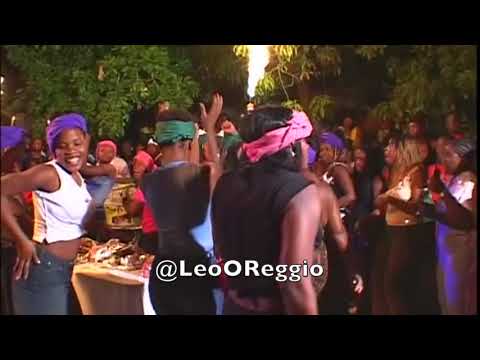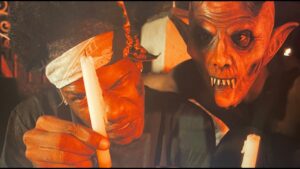
Candid Music Video Scenes#9 “Girl Gungo Walk” f/Capt Barky/Wickerman. (2001)
2023
@LeoOReggio
These video scenes are taken from the “Girls Gungu Walk” music video I produced for Wickerman and Capt. Barky. Don’t ask where is the music video as I have not located the master as yet. The scenes featured were recorded in Steelie and Clieve’s famous Studio 2000 and, if I remember correctly, the nine-night scenes were recorded somewhere in Portmore.
I also filmed scenes in a gungu walk with the artists and many girls but I have not located those tapes, as yet.
From Linstead, Wickerman (given name David Taylor) first came to national prominence as a recording artiste in the early 1990s alongside fellow deejay Captain Barkey. He started his career as a Yellowman sound-alike on Spanish Town sound systems during the 1980s, but at one stage he gave up music for a more fast-paced pursuit.
“I went to Caymanas Park because I wanted to be a jockey ’cause mi love racing. I used to be at [trainers] like Paul Newman, Howard McKenzie, and Errol Subratie, but after a time mi find seh mi a get tall an’ mi jus’ decide it wasn’t for me,” he said.
Back in Spanish Town, he began making craft items from wicker, which earned him his moniker. At the same time, Wickerman tuned into the hottest acts in “Spain” including Papa San, Dirtsman, Lady G, and Chronicle.
It was while working with Spanish Town sound system Stereo One, alongside Lieutenant Stitchie, Ricky Stereo, and Jonathan Wolfman, that he met Captain Barkey, a soldier in the Jamaica Defence Force.
They recorded several songs before splitting in the mid-1990s. Wickerman said he and Captain Barkey had several shows lined up in Europe when the latter was murdered in New York in 2012.
Captain Barkey, born Joslyn Hamilton on November 4, 1951, was a veteran of the sound system circuit.
A member of the Jamaica defense force for six years, Captain Barkey hails from an era when deejays (in Jamaican parlance, a deejay is an entertainer who raps or toasts lyrics, usually delivered in patois, over a rhythm track) refined their vocals working with a variety of sound systems, that is mobile discos which feature selectors playing the latest reggae (and other) hits. Barkey established a sizable following working with Stereo One sound system in the late 1980s alongside fellow deejays Lieutenant Stitchie and Wickerman who became his most frequent collaborator.
He had a few minor hits before topping the local charts 16 years ago with Go Go Wine, after which he scored with Bun Fi Bun.
He eventually partnered with fellow deejay Wickerman (real name David Taylor) and the duo put out a number of hits, recording for giant dancehall producers King Jammys and Steelie and Clevie.
In an interview with Billboard.biz producer Cleveland Browne, one half of the hit-making musician/production duo Steely and Clevie (Steely, b. Wyclef Johnson, passed away in 2009) recalls hearing about Captain Barkey during the Stereo One era. “I heard about a soldier who was mashing up the dances all over Jamaica. He brought a very disciplined approach to the music and his talent was exceptional. He had a great sense of humor that came out in his music,” Clevie remembered. “In 1991 we recorded two songs with him, “Original Get And No Chat” and “Gun”. The latter talked about his knowledge of the different types of guns, being an ex-army man, but not condoning their use. It is so ironic that the same weapon is what took his life.”
Steely & Clevie was a Jamaican dancehall reggae production duo that was composed of members Wycliffe Johnson and Cleveland Browne. The duo worked with artists such as the Specials, Gregory Peck (“Poco Man Jam,” 1990), Bounty Killer, Elephant Man, and No Doubt.
Steely debuted as a keyboardist with Sugar Minott’s Youth Promotion collective in the 1970s, playing the keyboards on Minott’s 1978 album, Ghetto-ology. Clevie pioneered the use of drum machines in reggae. Steely and Clevie first played together at Lee “Scratch” Perry’s Black Ark Studios during the late 1970s. In 1986, the duo was the house band at King Jammy’s Studio, which became the center point of late-1980s reggae, by which time Steely & Clevie became established production leaders with an immense slew of 12-inch and dub singles. The duo formed the Steely & Clevie label in 1987, a year in which reggae riddims and dub-influenced hip-hop production by Ced Gee and KRS-One in the Bronx became prominent.
In 1994, Steely and Clevie produced a new version of the 1967 track “You Don’t Love Me (No No No)” by Dawn Penn for the album Steely and Clevie Play Studio One Vintage. The track was released as a single that same year and became a Billboard Hot 100 hit in the US.
On 1 September 2009, Steely died in a hospital in East Patchogue, New York. He had been suffering from pneumonia after having recovered from kidney complications in December 2008. He had surgery for a blood clot in the brain shortly before he died. Clevie continues to produce and record.











